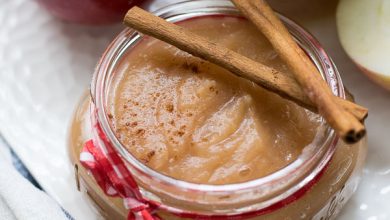Apple Cider Vinegar Marinade
🍏🍶 Apple Cider Vinegar Marinade 🍏🍶
Apple Cider Vinegar (ACV) marinade is a flavorful and tangy mixture used to marinate various foods, enhancing their taste and tenderness. It is a versatile marinade that can be used for meats, vegetables, and even tofu. Let’s dive into its history, components, preparation steps, and the time needed to make it!
📜 History:
Apple Cider Vinegar has a long history dating back to ancient civilizations like the Egyptians, who used it for various medicinal and culinary purposes. The use of ACV as a marinade likely evolved as people discovered its ability to tenderize meat and infuse flavors.
🧪 Components:
The basic components of an Apple Cider Vinegar Marinade include:
- Apple Cider Vinegar: The star ingredient, known for its tangy and slightly sweet flavor.
- Oil: Typically, olive oil or vegetable oil is added to balance the acidity and provide a smoother texture.
- Seasonings: These can vary but commonly include salt, pepper, garlic, and herbs like rosemary or thyme.
- Sweetener: Optionally, you can add honey or sugar to balance the acidity.
👩🍳 Preparation:
Here’s a simple recipe for an Apple Cider Vinegar Marinade:
Ingredients:
- 1/2 cup Apple Cider Vinegar
- 1/4 cup Olive Oil
- 2 cloves Garlic, minced
- 1 teaspoon Salt
- 1/2 teaspoon Black Pepper
- 1 tablespoon Honey (optional for sweetness)
- Herbs (e.g., rosemary, thyme) for extra flavor (optional)
Steps:
- In a bowl, combine the Apple Cider Vinegar, olive oil, minced garlic, salt, pepper, and honey (if using). Mix well to dissolve the salt and honey.
- Add your choice of herbs for extra flavor.
- Place the food you want to marinate (e.g., chicken, pork, vegetables) in a Ziploc bag or a glass container with a lid.
- Pour the marinade over the food, making sure it’s completely covered.
- Seal the bag or container and refrigerate it for at least 30 minutes to several hours. The longer you marinate, the more flavor it will absorb.
⏳ Time Needed:
The time needed to prepare an ACV marinade can vary depending on your preference. For a quick infuse of flavor, 30 minutes will suffice, but for a deeper flavor, you can marinate for up to 24 hours in the refrigerator.
Now you’re ready to create a delicious Apple Cider Vinegar Marinade that will elevate your dishes with its zesty and sweet-sour profile. Enjoy your culinary adventures! 🍏🍽️
Certainly! Here are the nutrition facts and some health information for the Apple Cider Vinegar Marinade:
Nutrition Facts (Per Serving – Approximately 2 tablespoons):
- Calories: 79 kcal
- Total Fat: 7g
- Saturated Fat: 1g
- Trans Fat: 0g
- Sodium: 290mg
- Total Carbohydrates: 4g
- Dietary Fiber: 0g
- Sugars: 3g
- Protein: 0g
Health Information:
-
Low in Calories: Apple Cider Vinegar Marinade is relatively low in calories, making it a suitable choice for those looking to manage their calorie intake.
-
Healthy Fats: The olive oil in the marinade provides healthy monounsaturated fats, which can support heart health when consumed in moderation.
-
Low in Sugar: This marinade contains a modest amount of sugar from the honey, but it’s relatively low in sugar overall.
-
Sodium Content: The sodium content is moderately high, so individuals on a sodium-restricted diet should use this marinade sparingly.
-
No Protein: The marinade doesn’t contain any significant protein, so it’s important to pair it with protein-rich foods if you’re looking to balance your meal.
-
Potential Health Benefits of Apple Cider Vinegar:
- Digestive Health: Some people believe that apple cider vinegar may aid in digestion and help with issues like indigestion and bloating.
- Blood Sugar Control: Some studies suggest that ACV may help improve insulin sensitivity, potentially benefiting those with diabetes.
- Weight Management: ACV has been associated with appetite control and may contribute to weight loss when incorporated into a balanced diet.
Remember that while apple cider vinegar has potential health benefits, it should be consumed in moderation. Excessive consumption may have adverse effects on tooth enamel and digestive health. Additionally, individual responses to ACV can vary, so it’s important to monitor how your body reacts to it.








